Child trafficking in China and UNICEF's response
- Available in:
- 中文
- English
Beijing, 21 February, 2011 – In the last few weeks the issue of child trafficking has been getting much attention in China. Large numbers of citizens have expressed their views in internet forums. In some cases citizen campaigns have been initiated to share information about missing children. Child trafficking affects children throughout the world, in both industrialized and developing countries. Globally UNICEF estimates that 1.2 million children are victimized by trafficking.
Children, defined by UNICEF as all persons under 18 years, are trafficked for many different purposes, including illegal adoption, sexual exploitation and labour exploitation, such as begging. However, not all children who beg on the streets are victims of trafficking. Some children are victims of labour exploitation but not trafficking, and others are begging independently as a means of survival.
Between 2000 and 2007, the Ministry of Public Security (MPS) detected 45,507 cases of trafficking in women and children. However, the actual number of women and children trafficked is believed to be far greater as cases generally involve several victims. Following a National Campaign on Combating Trafficking launched by Ministry of Public Security in April 2009, 13,500 cases of trafficking in women and children were investigated, resulting in 16,517 children and women victims rescued, and 1,228 foreign children and women victims repatriated by September 2010.
In April 2010, four ministries - the Supreme Court, the Supreme Procurator, the Ministry of Public Security and the Ministry of Justice - jointly issued an Opinion on Combating the Crime of Trafficking in Women and Children. According to this document, if local authorities are notified of street children or child beggars suspected of being trafficked, the police should immediately register the case and carry out an investigation.
UNICEF's response
Since 2002, UNICEF supported to Ministry of Civil Affairs (MCA) to develop community services for street children. An effective model for protecting street children was developed ("Zhengzhou Model") which included outreach programmes, a drop-in-centre, street desk, street children protection centre, referral services, foster care, community-based residential care, and vocational training. This model has been successfully replicated in 15 cities across China. In the future, UNICEF will support MCA to expand the services provided by these shelters to all vulnerable children, including victims of violence, abuse, neglect and exploitation/trafficking.
Since 2001, UNICEF has been working with the MPS to combat trafficking in human beings, focusing on legal reform, National Plan of Action implementation, and cross-border trafficking. UNICEF has also been working with All China Women's Federation (ACWF) since 2001 on the prevention of trafficking and assistance to victims.
UNICEF successfully supported the development of two bi-lateral agreements to prevent and combat cross-border trafficking with Myanmar (2009) and Vietnam (2010). Discussions on bi-lateral cooperation agreements between China and other neighboring countries are also being discussed.
In February 2010, China ratified the Palermo Protocol on Combating Trafficking in Human Beings. UNICEF support will focus on supporting government towards effective implementation of the Protocol, including technical support for legislative review.
UNICEF supported MPS to develop the first National Plan of Action (NPA) on Combating Trafficking in Women and children (2008-2012). In 2011, UNICEF will support MPS to develop the next NPA.
UNICEF aims to support MPS to develop child-friendly investigation procedures for dealing with child trafficking cases. In 2010, UNICEF supported the All China Women's Federation (ACWF) to initiate inter-agency discussions on assistance to children victims of trafficking.
In 2010 ACWF issued an official document requesting each village in rural areas and each community in urban areas to mobilize the existing network of "Women's homes" to provide information, counseling and referral to services for all vulnerable women and children. UNICEF will support the development and testing of service standards for "women's homes.
UNICEF is working with the Government to support the development of comprehensive social work services in communities to support vulnerable children.
What you can do if you suspect child trafficking or exploitation
A. For the general public: Be aware of and alert to signs that a child has been abducted, trafficked, exploited or abused. The recommended course of action is to alert law enforcement officials or child protection officials to the presence of children who they suspect are being abducted, trafficked, abused or exploited. In this way, officials can take steps to verify the suspected case and take follow up action.
B. For those working in social service delivery: Key persons for identifying trafficked or abducted children are social service workers having direct contact with children through the provision of services to the public. Within cities and communities, social services, child welfare agencies, health workers, education authorities, labour inspectors, police and other law enforcement officials, have a special role to play in being aware of, and alert to, signs that children are being exploited (e.g., not attending school regularly or being too exhausted to learn anything). They are also in a position to identify those who are vulnerable to being trafficked (e.g., children that drop out of school before finishing their compulsory education, unaccompanied migrant children, children living and/or working on the streets, children who have left families for reasons of neglect or abuse.). In border areas, government agencies responsible for immigration and in charge of border control points should also be alert to signs of child trafficking.
C. Note of caution on posting pictures of children on the internet or in the public media: Posting pictures of children or reporting on children may place them at risk of retribution or stigmatization, even if identities are changed or obscured. If in doubt, the reporter or person posting photos must err on the side of caution and the right of the child to be protected from harm. It is important to assess what action is in the best interest of the child.
Media contacts
About UNICEF
UNICEF works in some of the world's toughest places, to reach the world's most disadvantaged children. Across 190 countries and territories, we work for every child, everywhere, to build a better world for everyone. For more information about UNICEF and its work for children visit www.unicef.org.
| Visit UNICEF China website: www.unicef.cn Follow us on Sina Weibo: http://weibo.com/unicefchina Tencent Weibo: http://t.qq.com/unicef Wechat: unicefchina |




